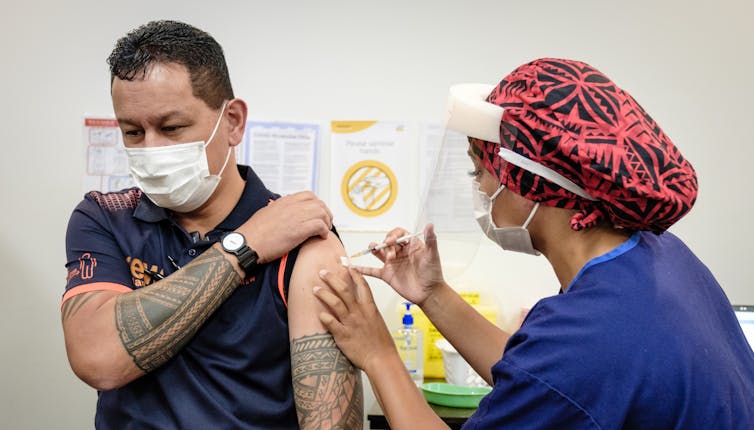More than 1 in 3 New Zealanders remain hesitant or sceptical about COVID-19 vaccines. Here's how to reach them
- Written by Jagadish Thaker, Senior Lecturer, School of Communication, Journalism and Marketing, Massey University
As Aotearoa New Zealand begins the third week of COVID-19 vaccinations, the focus turns from the 12,000-strong border workforce to their families and household contacts.
Frontline health and emergency staff will be next in line, followed by the general population. While we can expect border, health and emergency workers to be largely supportive of vaccination, the views among the general public vary significantly.
Drawing on national survey data based on 1040 participants, we identified four distinct groups: vaccine enthusiasts (36%), supporters (28%), hesitants (24%) and sceptics (12%).
 Surveys identified four distinct groups of how people respond to to COVID-19 vaccines.
Surveys identified four distinct groups of how people respond to to COVID-19 vaccines.
Our finding is similar to surveys commissioned by the Ministry of Health which found a quarter (24%) of respondents unwilling and another 16% unlikely to accept a “well-tested and approved” COVID-19 vaccine, with a slight increase in vaccine hesitancy between surveys. An online Spinoff poll conducted in May last year and again in February this year also found an increase in vaccine hesitancy.
The COVID-19 immunisation roll-out is New Zealand’s largest vaccination campaign and effective health communication will be important to its success. A key principle is to understand the different public segments, their vaccination intentions and the information sources they trust.
This can help health authorities and local advocacy groups better communicate the most important and useful information through channels most likely to reach their target public(s).
 A manager at the Jet Park managed quarantine facility receiving his vaccination.
Ministry of Health, CC BY-ND
A manager at the Jet Park managed quarantine facility receiving his vaccination.
Ministry of Health, CC BY-ND
How people receive information they trust
COVID-19 vaccine enthusiasts represent the largest segment of the New Zealand public. Almost all in this group “strongly agree” (98%) to taking a vaccine, strongly support restrictions against individuals who refuse to vaccinate, and have high trust in information sources. They are likely to be male, older, rich, highly educated, and are less likely to be Māori.
COVID-19 vaccine supporters represent a group in which most people say they “somewhat agree” (74%) to taking a vaccine. They are more likely to be male, young or middle aged, moderately educated with at least a certification or diploma, and of Asian ethnicity. This group may require a little nudge from their trusted sources of information such as health experts and mass media.
COVID-19 vaccine hesitants are divided about getting a vaccine. This group represents those who are most likely to choose “neutral” to getting the vaccine (79%) or putting their name on a list to get a vaccine (74%). This group is “sitting on the fence” and could be swayed either way.
Read more: COVID-19: four ways to respond to vaccine sceptics – and maybe even convince them
About 15% in this group have previously refused vaccination and a small minority (5%) have refused vaccination of their child. They are more likely to be female, young or middle aged, with low to moderate education levels, poor and Māori.
COVID-19 vaccine sceptics represent individuals who overwhelmingly say “no” to getting a vaccine (99%). About a third (35%) have previously refused vaccination and 18% have refused vaccination of their child. They strongly oppose any restrictions against individuals who refuse a COVID-19 vaccine if it were made mandatory. This group is likely to be female, older, poor, less educated, Māori and Pasifika.
Reaching vaccine hesistants and sceptics
Vaccine hesistants are the most important target group for a COVID-19 vaccination campaign as they are critical for “herd immunity”.
This group trusts information on social media, but has low levels of trust in mass media and health experts, thereby limiting the effectiveness of a mass media campaign to reach them.
Their key concerns include the rapid development and approval of the new vaccines, vaccine safety and effectiveness, and whether vaccination is actually needed at all. A social media campaign with information that addresses these concerns is likely to convince this group.
While vaccine sceptics make up only a small proportion of the population (12%), they are more likely to be from at-risk communities such as Māori and Pasifika. Our inability to convince members in this segment will not only hamper public health outcomes but further exacerbate historical health inequities, including a disproportional disease burden.
Read more: Research shows Māori are more likely to die from COVID-19 than other New Zealanders
The vaccine sceptics are more likely to trust information from family and friends. They are less likely to trust other sources of information, including mass media, social media and health experts. They report low trust in information on social media about COVID-19 and are more likely to describe it as fake.
A more localised communication campaign, through their trusted network of family and friends, is likely to be effective in reaching sceptics.
New Zealand has been a world leader in public health communication during the COVID-19 outbreak, ensuring the public understood and largely supported restrictions and adopted behaviours to prevent the spread of the virus.
An unprecedented scientific endeavour has resulted in the development and approval of a number of COVID-19 vaccines in a remarkably short time, within a year of the start of the pandemic. But this brings a new public health challenge — reaching that substantial proportion of the population that remains hesitant or sceptical about the safety and benefits of vaccination against COVID-19.
Authors: Jagadish Thaker, Senior Lecturer, School of Communication, Journalism and Marketing, Massey University



















